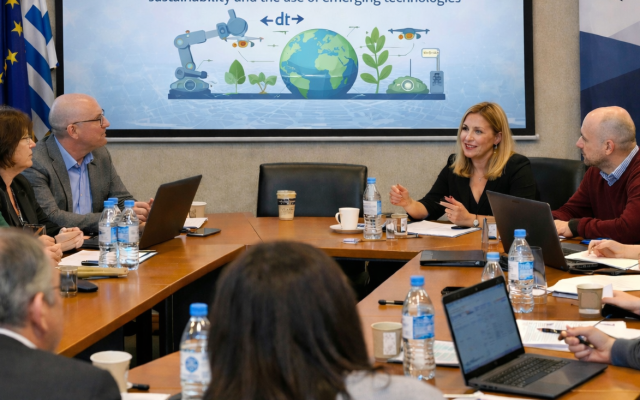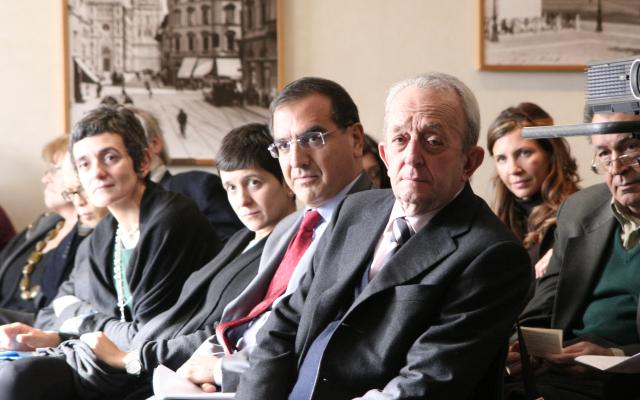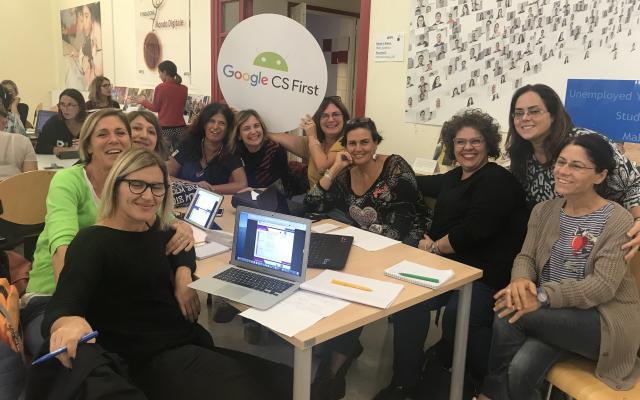CS First for language learning: the experience of an English teacher.
Prof. Paola Cappiello teaches at the Nicolò D’Arco lower secondary school at the Comprehensive Institute in Arco, in the Province of Trento, directed by Claudia Terranova. The professor, who has attended various webinars, has already experimented with the CS First Platform and tells us about her experience.
Have you already applied coding activities to curricular subjects?
No, I have never applied coding activities in my subject. With a class of 22-23 students and limited expertise in the subject, it is hard to work efficiently. However, coding has always fascinated me. My first experience dates back to 2014-15, when I attended a seminar on Scratch with Iprase. Although it was frustrating and I encountered many technical difficulties, I managed to learn a lot. With CS First, I find everything explained well and the videos definitely help with gradual learning.
What activities did you participate in and to what extent did you find them useful for teaching?
I participated in various webinars including Storytelling Club, Emotions, CS First and AI, Bullying, The Solar System, Geocoding, Spring Time… I really appreciated the collaboration between Google and FMD. Some webinars, such as those on the solar system, were a little complicated, but many can be used immediately in the classroom, such as those by Roberto Raspa. Others offer meaningful input or helpful resources, such as links to remove the background from photos and import them as sprites into CS First. My current interests include storytelling, AI, SEL, environmental sustainability, ECC, and life skills. I also like the webinars for primary schools. It seems that there is more room for creativity and imagination in these. A few of the critical issues I encountered were related to mobile devices, the receipt of reminder e-mails, and the limited time available to complete the questionnaire.
Have you already experimented with the CS First platform with your students?
Yes, this year I carried out extracurricular activities on Wednesday afternoons with groups of students from different second grade classes (13-14 students per term) on logical games. Have you developed a particular project with the platform? We started the course with CS First and the “High Seas Adventure.” Despite the instructions, the students immediately wanted to create ambitious projects. So, I set two conditions: create a video similar to the original, changing only one element, and a then a completely creative video. Each project had a specific deadline and included a self-evaluation checklist. In class, each team presented their projects and we proceeded with peer assessment. The experience was very positive, as the activities were engaging, and the student teams worked intensely. I answered most of the questions and handled the tasks well. The main difficulties were the weak connection and limited battery life of the school laptops. In the second half of the year, I introduced other projects, such as the trip to Europe, inviting the students to mix it as homework. Two students submitted personal projects, one on Poland and the other on the United States, and then presented them to the class. I like to always give them the opportunity to choose whether or not to carry out a proposed activity. I also introduced projects related to environmental sustainability, such as the one on bees, on the International Day dedicated to the issue, and then asked them to work in groups and build a hive using toilet paper rolls.
How has the platform impacted your teaching style?
The CS First platform has made my teaching style more interactive and engaging, allowing students to develop technical and problem-solving skills in a fun and practical manner.
And how can it improve student learning?
The project can improve student learning by stimulating them to be creative and to work better both in pairs and groups. Furthermore, it helps them develop critical thinking and overcome the fear of expressing their opinions and of being judged by increasing their autonomy and confidence in facing and solving complex problems. Thanks to PNRR resources, my school will activate language courses at the end of August. I will be involved as an English language expert and would like to combine my interests to engage fourth and fifth grade students in active and playful learning. The idea is to organize a virtual trip through Europe using CS First to introduce the topic with the quiz. In greater detail, I would like to structure these activities within the scope of active citizenship:
• Self-presentation through a visual map
• Packing your suitcase and understanding a train ticket
• Stories to listen to that introduce values such as friendship, family, trust, acceptance, choice and kindness
• Expression of the main emotions to evaluate the satisfaction of the story and the individual reaction to the story itself
• Exploration of five European countries: Italy, Greece, Spain, France, and the United Kingdom (flags and key facts – working in groups or pairs)
• Knowledge of the Euro and Pound currencies, and reflection on identity cards and passports (EU or not).
• Using CS First as an opportunity to create artwork presenting a story, representing a favourite scene or a beloved character.
• I am interested in exploring new possibilities of integrating coding into my curriculum by trying to involve as many learning styles and intelligences as possible, offering a variety of activities to choose from.
Can you tell us about a particular episode or story?
Some student pairs in the second group initially worked on the platform in English, thinking it was the only option available. It would be interesting to work exclusively in English although it may be a slightly longer process.
Do you have any suggestions for developing new platform applications?
I would suggest providing more English language resources for a complete learning experience. Furthermore, it would be useful to have on-line training webinars that are always accessible with detailed instructions for complex projects.




